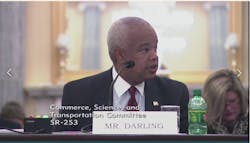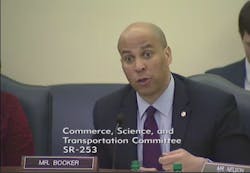In a confirmation hearing that served as a venue for Senators to vent their gripes about the Federal Motor Carrier Safety Administration, Scott Darling did what any good political nominee who wants a job should do: He told everyone what they wanted to hear. And that included assuring Commerce committee Republicans that FAST Act-mandated reforms of the agency and its regulatory platform were well underway while promising Democrats that the Republican-led rollback of driver hours of service limits would soon be addressed.
More broadly, Darling—nominated to be the next FMCSA administrator—emphasized the importance of “partnerships” with state enforcement agencies and the trucking industry.
Darling has led FMCSA since the departure of Anne Ferro in August 2014—so none of the issues were new to him. Indeed, the Wednesday hearing—chaired by Sen. Deb Fischer (R-NE)—was essentially a continuation of previous debate by the surface transportation subcommittee.
Last March Fischer challenged Acting Administrator Darling and the agency, detailing problems with both the HOS rule and the Compliance, Safety, Accountability (CSA) program. She later introduced reform legislation that ultimately was folded into the new highway bill, enacted in December.
“Unfortunately, some of the FMCSA’s actions over the past several years have challenged our shared goal of enhancing commercial vehicle safety,” Fischer said in her opening remarks, again citing a Government Accountability Office study critical of the CSA methodology used to rank the safety of trucking companies and the agency’s failure to address the report’s findings.
And while she commended FMCSA for acting quickly to remove CSA carrier rankings from public view, she questioned the agency’s recent proposal of a new Safety Fitness Determination rule that integrates “potentially flawed” roadside safety data into the rating process. She also noted the publication of the electronic logging device (ELD) mandate.
“It seems like you’ve been moving forward rather vigorously in the past several weeks,” Fischer said. “Why are you moving forward when we’ve already given you so much to do in the bipartisan FAST Act?”
Darling detailed the agency’s efforts to meet the new demands, and explained that the latest rulemakings had long been “in the works.” And he emphasized, after repeated questions from Fischer, that the SFD does not use the data Congress wants reviewed. The agency, he added, is in the process of arranging the CSA study.
“Good to hear,” Fischer said.
Restart study
Sen. Cory Booker, who led the opposition to the HOS restart rollback, again recalled the high-profile, 2014 accident in which a Wal-Mart Transportation tractor-trailer rear-ended a luxury van carrying actor Tracy Morgan—just one example of “carnage on our highways” involving trucks.
“This is absolutely unacceptable,” Booker said. “This cannot simply be the cost of doing business.”
And he again called for stricter HOS limits, noting that FMCSA had spent a decade developing the 2013 rule—only to have Congress put a halt to the new restart requirements.
Asked if the suspension “raised alarms,” Darling admitted that he was concerned, and noted that the study Congress has required before the restart provisions can be reinstated has reached of Office of the Secretary of Transportation, after which it goes to the Office of the Inspector General for a final review.
“I’m very proud of that study,” Darling said, adding that on the day the suspension was passed he personally called on stakeholders seeking participation. “They helped us create one of the best studies, I believe, on hours of service.”
“I literally believe that lives are at stake,” Booker said. “Do I have your commitment to take all possible actions to expedite this?”
“Yes,” Darling said. “You have my commitment to do whatever I have within my power to move the study.”
Sen. Bill Nelson (D-FL), the Commerce committee’s ranking member, likewise asked darling Darling to pledge his commitment to deliver the study “so that we can get to the much more rational rule on the number of hours for truckers to use.”
Sen. Steve Daines (R-MT), however, questioned the new ELD mandate and the “unintended consequences” of a “rigid rule” and an “inflexible time clock.” He cited a letter from a truck driver who reported that time pressures have already made the roads less safe.
“As administrator, how will you ensure that the regulations remain flexible enough so that truckers can make real-time decisions based on current road conditions and get home to their families without having to race the clock?” Daines asked.
Darling defended the ELD requirement, calling it “a safety rule.”
“It will provide accurate HOS data to allow truckers to make sure they have opportunities for adequate rest and downtime,” Darling said.
Following a period during which members may submit written questions, the committee will vote to recommend Darling to the full Senate for confirmation. A date for the vote has not been set.
About the Author
Kevin Jones 1
Editor
Kevin has served as editor-in-chief of Trailer/Body Builders magazine since 2017—just the third editor in the magazine’s 60 years. He is also editorial director for Endeavor Business Media’s Commercial Vehicle group, which includes FleetOwner, Bulk Transporter, Refrigerated Transporter, American Trucker, and Fleet Maintenance magazines and websites.

